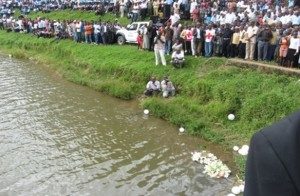
The arrest of Idelphonse Nizeyimana, a leading genocidaire, accused of killing thousands of Tutsis in the 1994 genocide – including Queen Rosalie Gicanda – was announced today.
Survivors Fund is often asked to comment on such news stories, which presents an opportunity to convey our perspective. However, due to the requirements of the media for a sound bite, it is always a challenge to convey our position in such few words. It is easier for us to do so in our newsletter, the October issue of which we have just published (to receive future issues, just sign up here).
However, on this announcement, we released the following:
“The arrest today of Idelphonse Nizeyimana is a positive development in the ongoing work for retributive justice for survivors. But there are still many more genocidaires at large, and still survivors of the genocide do not receive the support from the international community to deliver at the very least restorative justice to rebuild their lives. Until that situation changes, justice will never have been truly served.”
There were many points that we may have stressed, such as the cost and duration of trials at the International Criminal Tribunal for Rwanda (ICTR) which has amounted to more than $1 billion over the past fifteen years resulting in the conviction of less than 40 genocidaires. Though the ICTR has delivered some landmark rulings, is this money well spent, and how much more money will be required to now try Nizeyimana?
It is without question that the arrest is a positive development, but might justice be better served by trying him in Rwanda – an expedited and less expensive process? Then the UN may be more able to meet its resolution to provide greater assistance to survivors – where arguable justice would be better served.

